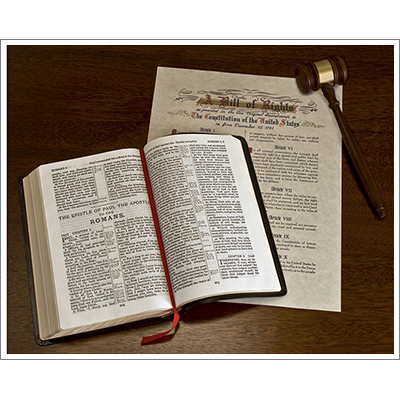The first ten amendments to the United States Constitution are known as the Bill of Rights. They spell out what the framers of the United States government deemed the most important and fundamental rights of citizens.
Of particular interest to me is the Sixth Amendment, which guarantees an accused individual the right to counsel in judicial proceedings. The Founding Fathers, aware that courts in England in their day commonly refused to let the accused have a defense lawyer, strongly believed in the importance of providing access to legal counsel. They were convinced that a person’s right to be represented and advised by a trained and skilled legal counselor was essential to ensuring fair treatment under the law. So the right to counsel was written into the Constitution and has been a cornerstone of America’s judicial system ever since.
As important as the right to counsel is to citizens, the counsel of the Lord is of even greater importance to us as believers. Let’s explore what the Word says about the counsel of the Lord and its enduring benefits.
In Proverbs, we see that the counsel of the Lord is vital to making our endeavors in life successful and of lasting impact.
Proverbs 19:21:
There are many devices in a man’s heart; nevertheless the counsel of the Lord, that shall stand.
“Devices” in this verse means projects, the plans we meditate on and develop by studied thinking. Developing plans and projects is great believing action we can take to bring to pass our heart’s desires; yet for our plans to work to our best advantage, we need to make them in harmony with the counsel of the Lord.
The Hebrew word for “counsel” means advice. Its meaning includes both deliberation and purpose and implies wisdom, reflection, and skill. Counsel that is “of the Lord” would have these qualities at the highest level.
The counsel of the Lord is not fleeting or temporary in its effect, for it “shall stand.” “Stand” means to be established, to stand out, to endure, to remain. According to the Theological Wordbook of the Old Testament, this word shows a legal usage that “connotes the validity of one’s testimony in a trial.” God’s counsel is like testimony that the judge in a court of law has pronounced valid, admissible, and corroborated. It stands on solid legal ground.
God graciously leads and guides us by His counsel. The Book of Psalms gives us insight on the beauty of God’s counsel and what our attitude should be toward it.
Psalms 32:8:
I will instruct thee and teach thee in the way which thou shalt go: I will guide thee with mine eye.
“Guide” in this verse is a form of the Hebrew word translated “counsel” that we saw earlier in Proverbs 19:21.
God says, “I will guide [counsel] thee with mine eye.” Since God is Spirit, He doesn’t literally have eyes. This is the figure of speech condescensio, or anthropopatheia, which attributes human characteristics to God. In the Bible, the terms “eye” and “eyes” are used to denote the grace and favor with which God looks upon His people. We see this in Deuteronomy, when Moses referred to the Promised Land as “a land which the Lord thy God careth for: the eyes of the Lord thy God are always upon it, from the beginning of the year even unto the end of the year” (Deuteronomy 11:12). The Psalmist David recorded his petition that God would keep him “as the apple of the eye” and hide him under the shadow of His wings (Psalms 17:8).
With God’s tender eye of grace and favor upon us, He directs and guides us. E. W. Bullinger, in Figures of Speech Used in the Bible, said that the latter part of Psalms 32:8 could be rendered, “I will cause My Spirit to graciously…inform thee and lead thee in the right way.” How beautifully that expresses the direction our heavenly Father gives us, leading us down the right path by way of His counsel!
The next verse gives a vivid admonition to not become stubborn and resist the counsel of the Lord. Let’s look at how The Amplified Bible renders Psalms 32:9:
Be not like the horse or the mule, which lack understanding, which must have their mouths held firm with bit and bridle, or else they will not come with you.
Animals such as horses and mules can be controlled by way of the bridle—headgear consisting of straps and metal pieces. The bit is part of the bridle, a specific metal piece that fits in the animal’s mouth and is connected to the reins. Horses and mules need a bit and bridle to be led about, but we can choose to respond to and delight in the counsel of the Lord, by which He tenderly and graciously guides us.…
This is an excerpt from the January/February 2009 issue of The Way Magazine.
Copyright© 2009 by The Way International. All rights reserved.
For more information on subscribing to The Way Magazine, Click Here

